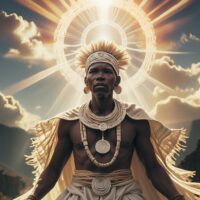Thixo : The Creator God
Listen
At a glance
| Description | |
|---|---|
| Origin | Xhosa Mythology |
| Classification | Gods |
| Family Members | Qamata (Son) |
| Region | South Africa |
| Associated With | Creation |
Thixo
Introduction
Thixo, also known as uThixo, is the supreme deity in Xhosa mythology, regarded as the creator and spiritual authority over the cosmos. He holds a position of immense reverence in traditional Xhosa belief systems and has become a bridge between indigenous spirituality and Christianity due to missionary influence in South Africa. Often associated with the sun, Thixo is seen as a guiding and protective force that shapes the world and all life within it. In Xhosa communities, the term “uThixo” now represents not only their ancestral deity but also the Christian God, reflecting how cultural identity and faith have evolved hand in hand.
Physical Traits
Descriptions of Thixo do not conform to human-like or visual representations commonly found in mythologies elsewhere. Thixo is typically formless, a divine presence beyond physical limitations. He is frequently associated with celestial phenomena—particularly the sun and the heavens—underscoring his transcendence and life-giving nature. This abstract conceptualization of Thixo emphasizes the deity’s omnipresence and symbolic distance from the mortal realm, reinforcing his status as a divine overseer rather than an embodied figure.
Family
In the Xhosa cosmological framework, Thixo’s lineage is more metaphysical than biological. He is often identified as the father or spiritual predecessor of Qamatha, a deity who carries out the work of creation and interacts more directly with the world. This spiritual hierarchy shows a layered understanding of divine authority, with Thixo as the original source of life and Qamatha as the active force shaping the universe. Additionally, the earth goddess Jobela is sometimes considered to be part of this divine family, acting as the maternal counterpart to Thixo’s cosmic fatherhood, adding depth to the mythological tapestry.
Other names
Thixo is known by various names that reflect the linguistic and cultural diversity of southern Africa. Among these, Mdali—meaning “creator”—is an indigenous term that emphasizes Thixo’s role in bringing the world into being. The name Qamatha is also used in some traditions and may either refer to a distinct being or another aspect of Thixo himself. Interestingly, the name Thixo is derived from the Khoisan deity Tsui’goab, which means “wounded knee,” highlighting historical connections between the Xhosa and Khoisan peoples. Missionaries adopted the term Thixo when translating Christian texts into Xhosa, preferring it over Qamatha or Mdali, thereby embedding the name deeply into both spiritual and religious discourse.
Powers and Abilities
Thixo’s powers lie at the core of Xhosa cosmology. As the originator of existence, he is believed to have created everything in the universe—land, sea, sky, animals, and human beings. His divine breath is thought to have animated the first humans, symbolizing the intimate bond between the spiritual and the physical. Beyond creation, Thixo functions as a guardian of natural order and morality. His influence is seen in the balance of ecosystems, weather patterns, and seasonal cycles. While Thixo does not usually intervene in human affairs directly, his presence is invoked in times of hardship, ceremony, or personal transformation. The belief in his omnipresence and benevolence guides ethical behavior and community harmony, making him not just a distant creator but an enduring moral compass.
Modern Day Influence
Related Images
Source
Neethling, B. (2019). The Deity Concept Among the amaXhosa of South Africa. In O. Felecan (Ed.), Onomastics Between Sacred and Profane (p. 111). Vernon Press.
Scheub, H. (2000). Thixo Creates Three Nations. A Dictionary of African Mythology. Oxford University Press.
Allen, P. J., & Saunders, C. (2018). THIXO (African mythology). Godchecker. Retrieved July 9, 2025, from https://www.godchecker.com/african-mythology/THIXO/
World Mythos. (n.d.). Thixo in Xhosa Culture. Retrieved July 9, 2025, from https://worldmythos.com/thixo/
Wikipedia contributors. (n.d.). uThixo. Wikipedia. Retrieved July 9, 2025, from https://en.wikipedia.org/wiki/UThixo




